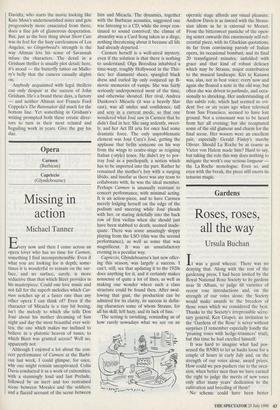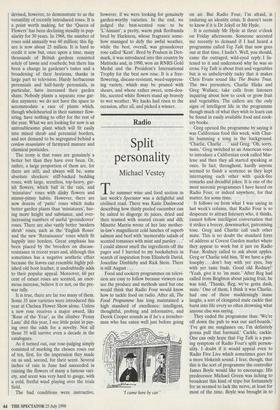Gardens
Roses, roses, all the way
Ursula Buchan
It was hard to imagine what had pos- sessed the RNRS to let us hacks loose for a couple of hours in early July and, on the strength of our votes alone, award prizes. How could we pen-pushers rise to the occa- sion, when better men than we have earned the right to judge the merits of new roses only after many years' dedication to the cultivation and breeding of them?
No scheme could have been better devised, however, to demonstrate to us the versatility of recently introduced roses. It is a point worth making, for the 'Queen of Flowers' has been declining steadily in pop- ularity for 30 years. In 1968, the number of roses sold annually was 60 million; this fig- ure is now about 25 million. It is hard to credit it now but, once upon a time, many thousands of British gardens consisted solely of lawns and rosebeds; but there has been a change in gardener's tastes and a broadening of their horizons, thanks in large part to television. Hardy herbaceous perennials and half-hardy perennials, in particular, have increased their garden share. Nobody plants a separate rose gar- den anymore: we do not have the space to accommodate a race of plants which, though wholehearted in their summer flow- ering, have nothing to offer for the rest of the year. What we are looking for now is an untroublesome plant which will fit easily into mixed shrub and perennial borders, and not demand to be segregated behind a cordon insanitaire of farmyard manure and chemical pesticides.
The irony is that roses are genuinely a better bet than they have ever been. Or, rather, a large proportion of them are, for there are still, and always will be, some absolute shockers: stiff-backed bedding roses, with large, scentless, top-heavy, gar- ish flowers, which ball in the rain, and 'miniature' roses with dinky flowers and mimsy-pimsy habits. However, there are now dozens of 'patio' roses which make better garden plants than 'miniatures', hav- ing more height and substance, and ever- increasing numbers of useful `groundcover' roses. There are also vastly better 'modern shrub' roses, such as the 'English Roses' and the new 'Renaissance' roses which fit happily into borders. Great emphasis has been placed by the breeders on disease- resistance in recent years and, although this sometimes has a negative aesthetic effect because the leaves can resemble highly pol- ished old boot leather, it undoubtedly adds to their popular appeal. Moreover, 60 per cent of extant roses are scented, an enor- mous increase, believe it or not, on the pre- war tally.
It is true, there are far too many of them. Some 35 new varieties were introduced this year at Chelsea Flower Show alone. Unless a new rose receives a major award, like 'Rose of the Year', as the climber 'Penny Lane' did this year, I see little point in pay- ing over the odds for a novelty. Not all those 35 will survive even a decade in the catalogues.
As it turned out, our rose-judging simply consisted of marking the chosen roses out of ten, first, for the impression they made on us and, second, for their scent. Several inches of rain in June had succeeded in ruining the flowers of many a famous vari- ety, and scent was very hard to gauge, with a cold, fretful wind playing over the trials field.
The bad conditions were instructive, however, if we were looking for genuinely garden-worthy varieties. In the end, we judged the best-scented rose to be `L'Aimane, a pretty, warm pink floribunda bred by Harkness, whose fragrance some- how managed to defy the awful weather, while the best, overall, was groundcover rose called 'Kent'. Bred by Poulsen in Den- mark, it was introduced into this country by Mattocks and, in 1990, won an RNRS Gold Medal and the President's International Trophy for the best new rose. It is a free- flowering, disease-resistant, weed-suppress- ing variety, which may be pruned with shears, and whose rather sweet, semi-dou- ble, scented white flowers stand up bravely to wet weather. We hacks had risen to the occasion, after all, and picked a winner.



























































 Previous page
Previous page